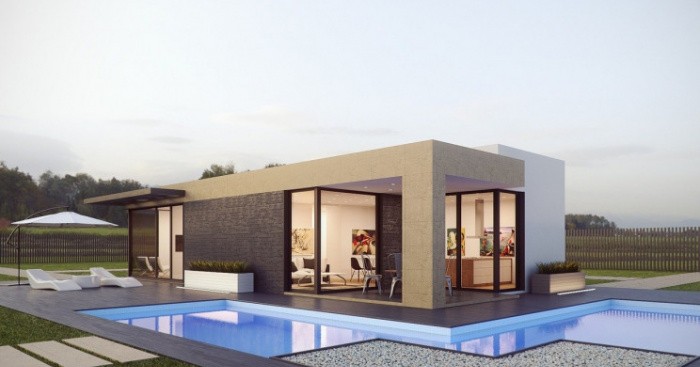
Prefabricated and modular houses have become increasingly popular in Portugal due to their greater simplicity and speed of construction compared to traditional masonry. And the new needs for space in the home and ways of life, generated by the Covid-19 pandemic, have contributed to a "fashionable" growth in the national market, keeping up with international trends. But how do you deal with licences and other aspects, such as taxes, in this type of construction? Here are the answers to your legal questions.
These houses are either pre-built buildings in sections or houses assembled from multiple modules. They are produced in a factory and transported to the site, where they are assembled into a single house and the final finishes carried out. This is an alternative to the construction of a traditional house (traditional masonry) in which the building is constructed from scratch on the land that will be occupied.
And if there are gains in terms of time and cost of prefabricated construction, besides other advantages - along with some disadvantages, such as logistics - one must also consider the costs and 'timings' of the legal procedures associated with this type of works in order to decide if this is the best option, as Belzuz Abogados* warns in this article prepared for idealista/news, focusing on the legal requirements that the choice of this type of construction entails.
Selecting the land
Before starting to manufacture the modules that will make up the house, the first step is to find the land on which the construction will be built.
It is advisable for the manufacturer to visit the chosen site to check its location, land conditions, sun and wind orientation, access, utility installation or requirements for a well or sanitary facility. All these factors will condition the final construction plan and the manufacturer may also quote land preparation costs if these are not included in the price.
From a legal point of view, the Legal Regime of Urbanisation and Building (DL no. 555/99, of 16 December) defines "Building" as "(...) the activity or result of construction, reconstruction, extension, alteration or conservation of a building intended for human use, as well as any other construction that is incorporated on the land on a permanent basis." It does not make any distinction between traditional masonry buildings and modular and prefabricated houses, so that the legal criteria to be applied when selecting a plot of land for construction will be similar to those applied in a traditional construction.
Thus, from the outset, any land that lies within the National Agricultural Reserve (RAN), the National Ecological Network (REN), protected areas or coastal areas should be excluded, given that the construction limitations in these areas condition or even make any project impossible.
Subsequently, the Municipal Master Plan (PDM) of the municipality where the land is located must be consulted, as this will be the instrument that will qualify the land (urban land, urbanisable land, rural land, natural and agricultural spaces, etc.).
Building the modular house
Modular homes are often promoted as being cheaper than traditionally built homes. It takes less time to build and, once the project, plan, materials and finishes are defined, the budget will not be subject to significant changes.
However, it is important to consider that modular constructions require a municipal licence and so the cost of this must also be considered, in addition to the construction and land purchase costs.
It is also important to bear in mind that obtaining housing credit for this type of construction is more difficult and, generally, the rates applied are higher and with shorter payment periods than for traditional construction or the purchase of a property that has already been built.
Licencing Process
The legal framework of modular or prefabricated houses is similar to that of traditionally built dwellings, so licencing of this type of construction is compulsory.
Therefore, before going ahead with the construction, one should request prior information from the Municipal Council where the house will be built, in order to guarantee the viability of the project. Subsequently, the architectural project - descriptive memory, plans, sections, elevations, and other elements - must be presented to the City Council of the municipality where the house will be built, and this process must take place before the assembly and construction of the work begins.
Once the architectural project is approved, the technical projects must be presented - sewage, power supply and electrical distribution and gas installation - so that the City Council can consult the entities that must issue an opinion, authorisation or approval, analyse the building and issue the building permit.
Once the building permit is issued the construction work can proceed, and there must be a contractor responsible for the work and the site book.
Once construction is completed, a use license must be requested from the City Council’s urban planning services, which will be issued after the inspections confirm that the work carried out/built complies with the approved projects, water certifications and sewers.
Payment of taxes
Regardless of the type of construction - masonry, wood, prefabricated or modular - municipal property tax (IMI) is levied on the taxable asset value of urban and rural buildings located in Portuguese territory. So, when the property is registered with the tax authority and the respective caderneta predial (legal description) issued, this tax must be paid annually.
In conclusion, although the construction of modular and prefabricated houses may be faster in terms of construction method and technology, the same is not true for legal procedures, which have response times and costs similar to those of a traditional construction.
*Ricardo Pires Jordão, Real Estate Department of Belzuz Abogados S.L.P. - Portuguese Branch